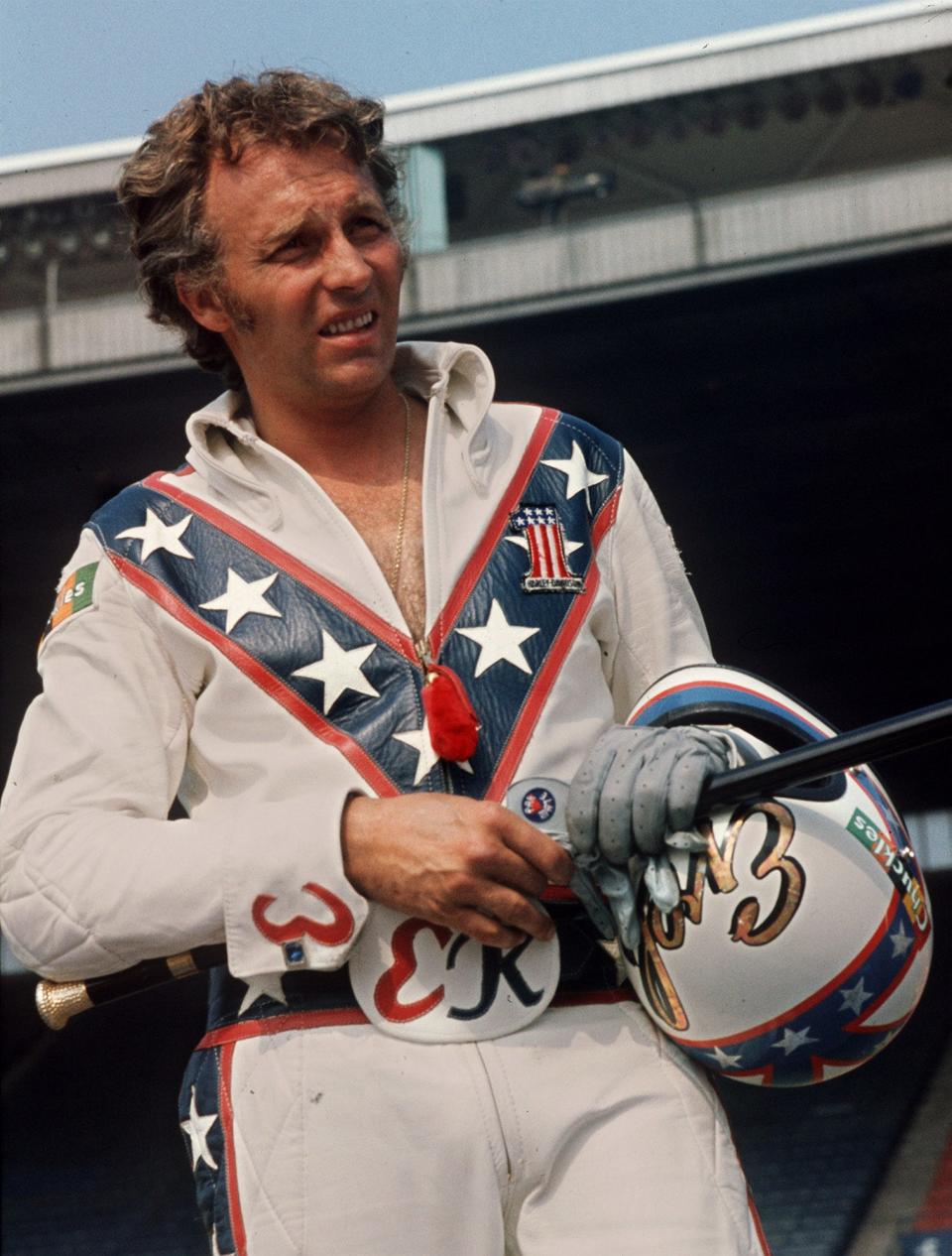Evel Knievel ran for president? It's not that crazy a premise. Think Donald Trump.
- Oops!Something went wrong.Please try again later.
- Oops!Something went wrong.Please try again later.
Reporters representing TV news, radio and newspapers – some from as far away as Salt Lake City – were all there. They had come to the Metals Bank Building at the corner of Park and Main in Butte, Montana, that August day in 1971 for a big announcement: Daredevil Evel Knievel would be running for president in 1972.
It was a publicity stunt, of course, one dreamed up by Butte booster Paul Holenstein, but the mayor was there, as were other Butte dignitaries, such as they were.
One man not there: Knievel. He was in Atlanta. He wasn’t in on the plan. But reached by phone, as recounted in the Montana Standard, he was all for it.
"I get a hell of a lot of mail from all over since I made the 'Evel Knievel' life story movie," he said, referring to the 1971 biopic that starred, if you can believe it, George Hamilton, as the crude, rude, larger-than-life motorcyclist. "If I get that bike juiced up enough maybe I could ride right into the White House!"
Obviously none of this was serious, and zero of it panned out, but the notion may not have been as ludicrous as it seems.

Celebrities rode fame into political office long before Donald Trump
First, of course, is the relative success of celebrities of various stripes in riding name identification, charisma and Q ratings to office – from Ambassador to the United Nations Shirley Temple Black, to congressmen who previously starred on "The Love Boat" or "The Dukes of Hazzard," to former President Donald Trump.
Who wins in Trump indictment? The former president and Joe Biden. DeSantis? Not so much.
It is a premise I had fun exploring in my new thriller, "All the Demons Are Here," which takes place in 1977. David Letterman got there before me, of course, making in 1991 a "Top 10" list of what would happen if Knievel became president. (No. 10: Nation's interstate system would include regularly spaced jump ramps. No. 8: More fatalities at annual Easter Egg hunt. No. 3: Dan Quayle would still be vice president, but his kids would take him seriously.)
But second, Knievel – who in addition to his superstardom was antisemitic and of rather low personal character – had arguably more political acumen than some of our other celebrities-turned-politicians.
When Mr. Knievel went to Washington
One bit of research for my novel that I was pleasantly surprised to learn about took place in 1961, when then-Robert Knievel was a poacher. (The "Evel" nickname came later, from a cop, during Knievel's career as a burglar.)
Knievel would regularly, illegally, go into Yellowstone National Park, often with customers, to kill elk. In 1961, the National Park Service proposed killing about 5,000 elk to control the overpopulation. This made no sense to 23-year-old Knievel.
That December, he hitchhiked from Butte to Washington, D.C., to give a pair of elk antlers, with a more than 50-inch spread, to President John F. Kennedy and to protest the Park Service proposal. Knievel wanted the elk instead transferred from the park to other parts of the West.
Tucker Carlson destroyed his life. Now this Arizona man may take down Fox News.
Seven days and 27 hitch-hiked rides later, Knievel arrived in Washington. He didn't get the meeting with JFK, but Knievel did get to administrative assistant Mike Manatos and more significantly to Rep. Arnold Olsen, D-Mont. Soon enough, Knievel had Montana's two Democratic senators, Mike Mansfield and Lee Metcalf, help set up a meeting with JFK's secretary of the Interior, Stewart Udall.
"I was wearing a pair of cowboy boots and carrying a briefcase that was empty," Knievel told Sports Illustrated. "There was nothing in it at all."
Opinion alerts: Get columns from your favorite columnists + expert analysis on top issues, delivered straight to your device through the USA TODAY app. Don't have the app? Download it for free from your app store.
Lore has it that Udall agreed to Knievel's proposal the next day. Montana Standard coverage of the elk situation in January 1962, however, reported more mixed results – with 2,000 elk killed by rangers, and thousands more moved to Eagle Creek and Decker flat near Gardiner, Montana, and Jackson Hole country in Wyoming.
It wasn’t long, of course, before Knievel moved on to other pursuits.
Regardless, it's not difficult to imagine a world where Evel Knievel tried to drive his Harley into politics. He had already learned some of the lessons of politics in the United States that we all see today: the value of concocting clever stunts, determination to be heard, and the degree to which impression of achievement frequently trumps actual achievement.
Though he did not ultimately act on his acumen for political power, Knievel's political DNA runs strong through many of our public officials today.
Jake Tapper, CNN’s chief Washington correspondent and chief DC anchor, is the author of the new thriller "All the Demons Are Here."
You can read diverse opinions from our Board of Contributors and other writers on the Opinion front page, on Twitter @usatodayopinion and in our daily Opinion newsletter. To respond to a column, submit a comment to letters@usatoday.com.
This article originally appeared on USA TODAY: Evel Knievel to Trump: Celebs ride fame-grabbing stunts into politics

